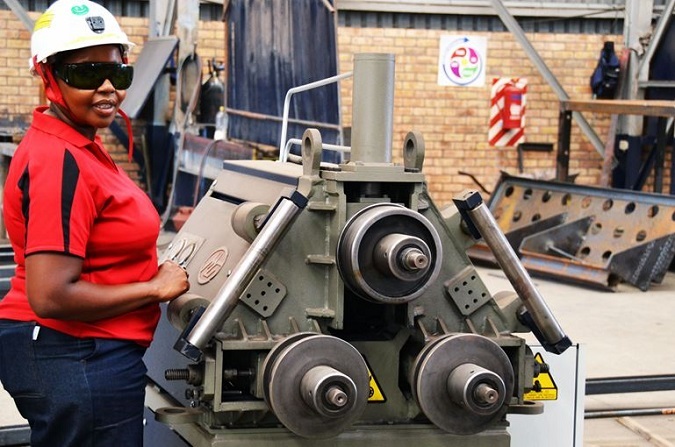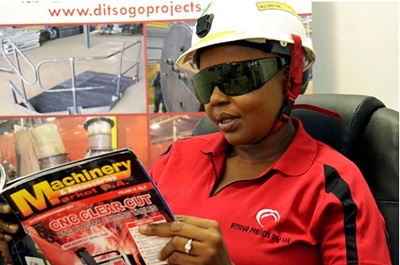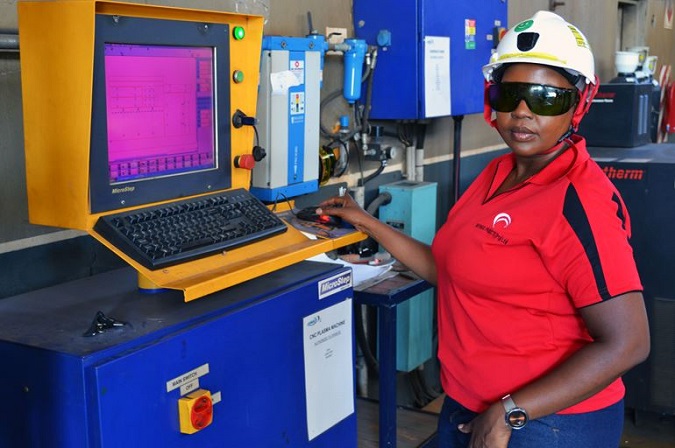UN Women’s Sharefair on Gender Equality in the Extractive Industries Helps a Woman to Break the Odds in Steel and Manufacturing Industry in South Africa
Date:
My Story into this male dominated sector
Ms.Tebogo Mashego’s entrepreneurial background started when she resigned from her well-paying job to join private business in steel and manufacturing industry. She had initially been inspired by SAB Kickstart advert in 2008 looking for young, innovative entrepreneurs seeking business skills, mentorship and grant funding to Kickstart their businesses. Having won the SAB Kickstart in 2009, she received a lot of business growth opportunities. She also received media exposure that helped her set market base and increased export sales internationally to Malawi, Zambia and Kenya. Earlier she had worked with Diep K Steel & Aluminum which they both co-founded and had created 65 sustainable job opportunities in metal fabrication.

The 7 years’ experience made her realize that she had a great potential to grow businesses in a male dominated manufacturing industry and wanted to empower and inspire other women by creating opportunities for them. She wanted a very challenging, high capital intensive and lucrative business with high returns on investment. On this premise, she decided to separate from her family business and ventured on her own to develop Ditsogo Projects in Rustenburg, South Africa with the main focus of creating more jobs for unemployed rural youth and women and also to create a lasting legacy for her family and children. She identified a need to expand into heavy industrial metal engineering and fabrication and she also realized that quite a few women are operating in the industry. She chuckles and acknowledges that manufacturing sector is a very sustainable business that is positively adding value to the economic growth of her country.
Ditsogo Projects is a manufacturer of metal fabricated products and supplier of steel engineering services for the mining industry, hospitality and agricultural sectors. They specialize in manufacturing transfer chutes, hoppers, conveyor structures, feeder tanks, vibrating screens, palisade fencing, platform cat ladders, heavy metal locking devices, as well as providing metal plates and tubing, cutting, rolling, bending and perforation of metal.
Ms.Tebogo ventured into male dominated steel business because she had previous experience and knowledge of the steel fabricating, which was gained 8 years ago while working with her husband in a gates manufacturing business called Diep K Steel & Aluminium which they both co-founded. In their earlier business they were mainly focusing on residential supply of gates and fencing, burglar bars, staircases and aluminium doors & windows.
Acquisition of new knowledge has been helpful
In order to overcome the barriers in male dominated sector, she went to further upskill her knowledge and skills by completing Wispeco aluminium fabrication training. She went to Germany to do metal fabrication mentorship and learned about ISO 9001 and CNC machinery, quality. She further completed the Goldman Sach’s 10000 Women through GIBS, which helped to improve her leadership skills, operational, strategic management skills, negotiation and problem solving skills. She approached several government agencies for funding to buy machinery and to train staff, however she had no luck breaking through. She admits that she is still faced which the challenges of lack of finance to service large projects and to purchase materials. She had to be flexible and innovative to sign a service level joint venture agreement with one of the largest fabricators in her town and now she has access to the latest technology, pool off machinery and transport provided by the company.

All is not rosy for Tebogo venture since she faces challenges including job-family balancing acts and that of mining companies, government and big businesses not procuring from local women owned businesses. Other challenges she experienced when setting up the business included lack of access to funding and technologies to improve production, poor infrastructure, lack of industrial machinery, lack of procurement support from mining companies and government, high costs of steel, diesel costs, factory rental, and lack of access to information regarding procurement opportunities.
UN Women’s Sharefair on Gender Equality in the Extractive Industries Opened Space for My Participation in the Sector
Having participated in the 2015 Sharefair on Gender Equality in the extractive industries organized by UN Women in October 2015 in Nairobi, Kenya and being one of the panelists, she shared her experiences as a female vendor in the extractive industries. She also networked and linked with women from Tanzania, Kenya and Uganda who are going through similar problems. She admits to having explored opportunities with similar organizations operating in manufacturing of extractive products, found new markets for her steel, and changed the profile of her organizational operating model while improving quality management systems and diversifying into other sectors which need her services. Further, she collaborated with other women globally, shared knowledge and skills while exploring her interest in small scale mining in Kenya by learning about gemstones, jewelry manufacturing and minerals trading (gold, diamond and chrome) and learnt the possibilities of importing them.
She says “The Sharefair shaped my strategy and I was inspired to adopt innovative models of business and operations in the industry. In fact, after the Sharefair, I changed my operating model from manual to automated model and upgraded the quality of my management systems. I have also used the knowledge I acquired at the Sharefair and through networks I build there to diversify into other sectors which relate to my current business model. As a result, I have expanded my markets and has increased my income in a short span of only six months.”
The power of information and communications technologies in driving business and profitability

As a young woman who is innovative and creative, Ms.Tebogo admits having learnt additional use of latest technologies and machineries during the Sharefair through interactions with other industry players at the Sharefair. The technologies help her to produce quality durable products. She does digital marketing through social media and her website and strives to understand the current trends in the industry to be competitive to other competitors, increase sales and market share and manufacture custom made products for international exports.
Sharefair was an inspiration!
In her inspiration to other women, she remembers a presentation by the Chief Executive Officer of National Oil in Kenya, Ms. Sumayya Hassan, which changed her mind set for the best in the industry. She recalls that through the session on “Addressing Challenges That Prevent Women from Advancing in the Extractive Industries,” at the Sharefair, she has come to appreciate that perseverance is important to business continuity and success. That women in the extractive industries must learn from their competitors’ mistakes and always treat customers with respect. She says the Sharefair helped her to appreciate technology as a major driver of business and profitability.
“I learnt that for women to succeed in the industry, they must invest part of their profit in upgrading machinery, technology and software. We must not be afraid to take risks. In fact, we must be very passionate about what we are doing.” She comments during our interview with her.
The power of women’s networks
The Sharefair also helped her to appreciate the power of women’s networks. She has learnt to network with successful and like-minded women in the extractive industries who are also keen on sharing their operational strategies with her while investing on continuous training and development. Due to the inspiration she got at the UN Women’s Sharefair on Gender Equality in the Extractive Industries, she always empowers herself with latest skills and technologies to remain knowledgeable, competitive and relevant to the male dominated industry.
The Sharefair has not only been appreciated for taking Tebogo to heights of innovation and networking but she also learnt during the parallel sessions on how to achieve competitive advantage for her company. She has used the skills acquired to position her company in the industry. “I learnt how to differentiate my company from competitors and used it to increase my market share and sales pitch” said Ms. Tebogo during an interview by UN Women.
She has got several awards including who is who Entrepreneurship achievement in SAB Kickstart 2008/9, Ernst and Young 2014 Entrepreneurial winning women, Vital Voices Global Fellowship participant 2013 among other awards through outstanding performance in the male dominated sector.
To her, the Sharefair was an opportunity to network, create business to business linkages, learn about good practices and research in the extractive industries sector, appreciate the challenges women face and how to mitigate them in the sector, link to the latest technologies showcased in the session on gemstones and with other panelists and build more coping strategies in the male dominated industry. “The Sharefair opened my eyes a lot to other opportunities and networks which I have used to expand my business and employ more innovative models of entrepreneurship in the extractives sector which has always looked impenetrable,” she mentions as she smiles with appreciations on her attendance to the Sharefair event.
In her own words
Our old business model involved manual bending and twisting of metals which delayed production. We used compressors to paint products which produced low quality finishes. We didn’t engage all employees for suggestions on new product developments and lacked formalized manufacturing processes.
I attended the Sharefair on Gender Equality in the Extractive Industries organized by UN Women in Nairobi and learnt a lot about positioning our business model. After attending the Sharefair, we (our company) now understand the client needs and we avoid losing our edge to the competition. The Sharefair exposed us to latest technologies, trends of reducing costs, increasing productivity and maintaining a sustainable profitable business. We diversified into different sectors. We have also appreciated marketing as a concept and we now advertise online and have access to shared data with partners.
The Sharefair also helped us to differentiate our business by choosing our core values and products and doing them better than anyone. We were inspired during the Sharefair until we have taken on innovation and have re-designed our products. We provide excellent customer service and we do not compromise on quality as well.
In fact, after taking on the good practices shared at the Sharefair, we have managed to reduce our operational costs by 20% and we are estimating an annual turnover of R4 million rand in 2016 as compared to the previous annual turnover of R2.8 million in 2013-2014.
We now have a professional web presence. Please visit our website on www.ditsogoprojects.co.za
About the UN Women’s Sharefair on Gender Equality in the Extractive Industries
The United Nations Entity for Gender Equality and the Empowerment of Women (UN Women) – in collaboration with key partners – held a Regional Sharefair on Gender Equality in the Extractive Industries from 13–15 October 2015 at the United Nations Complex in Nairobi, Kenya. Focusing on the overarching theme of Building on Good Practices, the three-day Sharefair served as an inspiring platform for sharing knowledge and experience, establishing partnerships, and developing solutions to stimulate interest and collaborative efforts in engendering the extractive industries in Africa. Over 400 participants – including researchers, policymakers, development agencies, United Nations agencies, regional economic commissions, the African Union, civil society organizations, women in the extractive industries, business leaders, investors, private sector representatives and practitioners – gathered at the Sharefair to discuss innovations, best practices, evidence from research and documented data, and legal frameworks and policies. The Sharefair also provided opportunities for networking, advocacy and capacity-building in support of women in the extractive sector.
Through a series of plenary and interactive group discussions, challenges, solutions and opportunities were identified for gender equality and women’s empowerment in the extractive industries. Trends in the sector were discussed, and feasible interventions to amplify the impact of gender equality in the extractive industries were identified. Diverse opportunities for knowledge sharing and networking were provided via the Sharefair exhibition booths. These featured over 50 organizations and women in the extractive industries exhibiting their products and services – affording a novel way of connecting participants and industry players. Throughout the Sharefair, special attention was given to the role of women in the extractive industries in the post-2015 development agenda.
The Sharefair concluded with the development of an outcome document for gender equality and women’s empowerment solutions in the extractive industries – a culmination of the lessons learned and discussions of the past three days. This pathway document focused on critical intervention areas that could spur gender equality in the extractive industries including national and regional policy and legal considerations; advocacy, capacity and communication; research, knowledge management and capacity-building; private sector development; business development and innovation; and a repeat of the Sharefair to fast-track the proposed intervention areas. The recently approved Sustainable Development Goals – especially Goal 5, Achieve gender equality and empower all women and girls – and their 40-plus gender-related targets also create new opportunities to reconnect, recommit, and mobilize political will and public support for women’s economic empowerment.